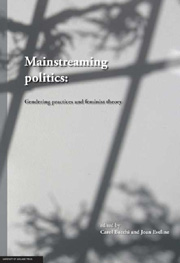Book contents
- Frontmatter
- Contents
- Preface
- Personal reflection
- Publisher's note
- List of authors and project personnel
- Acknowledgements
- Introduction
- 1 Gender/ing impact assessment: Can it be made to work?
- 2 Mainstreaming and neoliberalism: A contested relationship
- 3 Gender analysis and social change: Testing the water
- 4 What are we mainstreaming when we mainstream gender?
- 5 Approaches to gender mainstreaming: What's the problem represented to be?
- 6 Power, resistance and reflexive practice
- 7 Gender mainstreaming: The answer to the gender pay gap?
- 8 Gender analysis and community participation: The role of women's policy units
- 9 The invisibility of gendered power relations in domestic violence policy
- 10 Gender mainstreaming versus diversity mainstreaming: Methodology as emancipatory politics
- 11 University-public sector research collaboration: Mine the space, never mind the gap
- 12 Obeying organisational ‘rules of relevance’: Gender analysis of policy
- 13 Gender mainstreaming or diversity mainstreaming? The politics of ‘doing’
- Conclusion A politics of movement
- Author Index
- General Index
2 - Mainstreaming and neoliberalism: A contested relationship
Published online by Cambridge University Press: 05 June 2012
- Frontmatter
- Contents
- Preface
- Personal reflection
- Publisher's note
- List of authors and project personnel
- Acknowledgements
- Introduction
- 1 Gender/ing impact assessment: Can it be made to work?
- 2 Mainstreaming and neoliberalism: A contested relationship
- 3 Gender analysis and social change: Testing the water
- 4 What are we mainstreaming when we mainstream gender?
- 5 Approaches to gender mainstreaming: What's the problem represented to be?
- 6 Power, resistance and reflexive practice
- 7 Gender mainstreaming: The answer to the gender pay gap?
- 8 Gender analysis and community participation: The role of women's policy units
- 9 The invisibility of gendered power relations in domestic violence policy
- 10 Gender mainstreaming versus diversity mainstreaming: Methodology as emancipatory politics
- 11 University-public sector research collaboration: Mine the space, never mind the gap
- 12 Obeying organisational ‘rules of relevance’: Gender analysis of policy
- 13 Gender mainstreaming or diversity mainstreaming? The politics of ‘doing’
- Conclusion A politics of movement
- Author Index
- General Index
Summary
Introduction: Carol Bacchi and Joan Eveline
As with the previous chapter this article was written in the lead-up to the commencement of the Gender Analysis Project. It pursues the increasing controversy about whether or not gender mainstreaming ought to be considered a victory for feminist reformers. This debate was generated in part due to the proliferation of gender mainstreaming initiatives in organisations and states with free market agendas and the associated removal of women's policy units and positive action initiatives. Those who believed that mainstreaming was in fact resistant to free market liberalism tended to argue that the expansion of state activities associated with the reform challenged the neoliberal focus on small government.
Our contribution to this debate emphasises the need to recognise that neoliberalism is not anti-state but that it encourages a particular kind of state, one that steers from a distance. Hence there is no necessary tension between neoliberalism and forms of gender mainstreaming that focus on strengthening the political arm of government.
We also develop the hypothesis that the degree of resistance or complicity between gender mainstreaming and neoliberalism is related to the form of gender mainstreaming (or gender analysis) introduced. Following from Chapter 1 the case is made that a ‘differences’ model of gender analysis rests on individualist premises that provide some congruence with neoliberalism, while a ‘gender relations’ approach is more likely to be resistant.
- Type
- Chapter
- Information
- Mainstreaming PoliticsGendering Practices and Feminist Theory, pp. 39 - 60Publisher: The University of Adelaide PressPrint publication year: 2010
- 3
- Cited by



